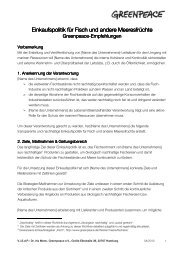SOLAR GENERATION - Greenpeace
SOLAR GENERATION - Greenpeace
SOLAR GENERATION - Greenpeace
You also want an ePaper? Increase the reach of your titles
YUMPU automatically turns print PDFs into web optimized ePapers that Google loves.
EXECUTIVE SUMMARY<br />
achieving greater penetration of solar electricity into the<br />
energy mix at local, national, regional and global levels.<br />
A number of key political actions are required:<br />
Since system sizes are much smaller and the population density<br />
greater, this means that up to a billion people in developing<br />
countries would by then be using solar electricity. This would<br />
represent a major breakthrough for the technology from its<br />
present emerging status.<br />
By 2040, the penetration of solar generation would be even<br />
greater. Assuming that overall global power consumption had<br />
by then increased from 25,578 to 36,000 TWh, the solar<br />
contribution would equal 21% of the world’s electricity output.<br />
This would place solar power firmly on the map as an<br />
established energy source.<br />
<strong>SOLAR</strong> <strong>GENERATION</strong>:<br />
PV’S CONTRIBUTION TO INDUSTRY, EMPLOYMENT<br />
AND THE ENVIRONMENT<br />
• Firstly, an annual world PV market growth of 3.7 GWp+ by 2010<br />
will only be achieved through the extension of best practice<br />
support schemes, appropriately adapted to local circumstances,<br />
to encourage the uptake of solar electricity amongst consumers.<br />
The German and Japanese experiences highlight the impact<br />
which such actions can have on the global photovoltaics<br />
industry.<br />
• Secondly, the inherent barriers to the take-up of solar power -<br />
and the subsidies available to fossil and nuclear fuels which<br />
currently penalise renewable sources - must be removed.<br />
• Thirdly, a variety of legally enforced mechanisms must be<br />
implemented which secure and accelerate the new market for<br />
solar photovoltaics. Particularly in industrialised and emerging<br />
economies, the introduction or expansion of premium feed-in<br />
tariffs with guaranteed lifetimes must be a cornerstone of all<br />
future promotion mechanisms for solar electricity.<br />
Our goal now must be to mobilise the necessary industrial,<br />
political and end-user commitment to this technology and,<br />
more importantly, the service it provides. We must redouble our<br />
efforts to ensure that the generation born today benefits from<br />
all the socio-economic and environmental benefits that solar<br />
electricity offers.<br />
For the solar production industry, global annual shipments of<br />
PV modules will rise from 750 MWp in 2003 to more than<br />
48,000 MWp in 2020. This represents an increase by a factor of<br />
64.<br />
For the job seekers of the 2020 generation, this would represent<br />
a major contribution towards their employment prospects. On<br />
the assumption that more jobs are created in the installation<br />
and servicing of PV systems than in their manufacture, the<br />
result is that by 2020, more than 2.25 million full time jobs<br />
would have been created by the development of solar power<br />
around the world. The majority of those would be in installation<br />
and marketing.<br />
By 2020 solar PV would also have had one other important<br />
effect. In environmental terms, it would have reduced annual<br />
COc emissions by 169 million tonnes. This reduction is<br />
equivalent to the emissions from all 45 million cars currently<br />
operating in Germany, or 76 coal-fired power plants. Cumulative<br />
COc savings from solar electricity generation between 2003 and<br />
2020 will have reached a level of more than 730 million tonnes.<br />
POLICY RECOMMENDATIONS<br />
In order to supply up to a billion people with solar electricity by<br />
the year 2020, and go on to achieve a global electricity share of<br />
21% by 2040, a major shift in energy policy will be needed.<br />
Experience over the past few years has demonstrated the<br />
effectiveness of joint industrial and political commitment to<br />
8

















